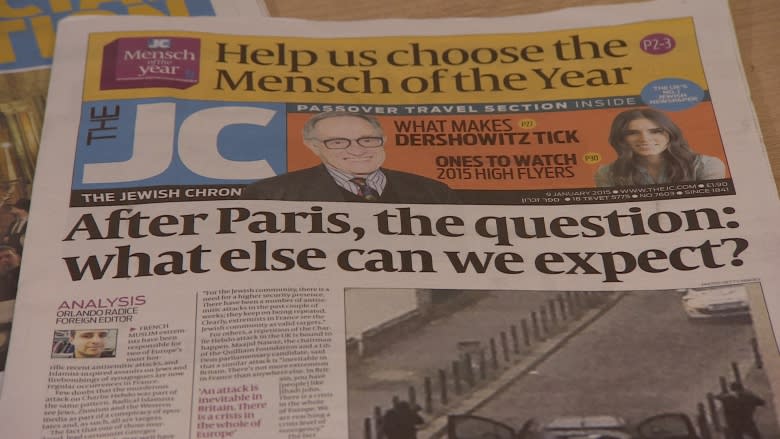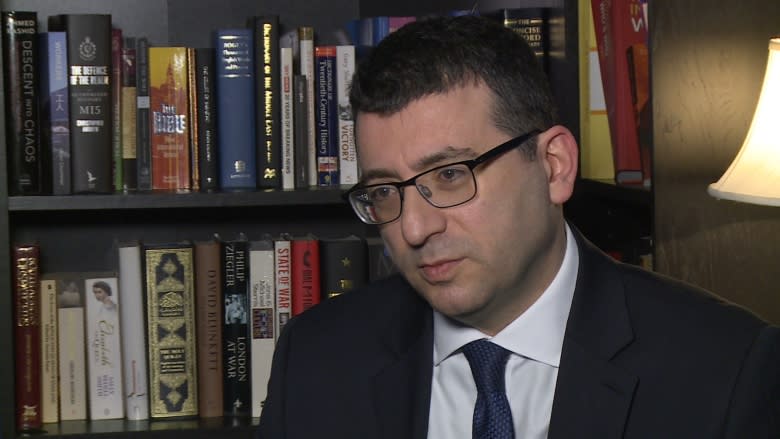Britain's Jewish community on edge after Paris attacks
The security guard pacing the pavement outside the small offices of the Jewish Chronicle in a North London neighbourhood is a brand new phenomenon.
The paper, founded in 1841, sits nestled in one of the back lanes of Golder’s Green, home to a thriving Jewish community.
Chronicle reporter Rosa Doherty says the security guard was hired about a week after the attack on a Jewish supermarket in France that left four dead.
She’s been reporting on the protective measures the British government ordered for Jewish neighbourhoods in the wake of the attacks.
"In London, Jewish schools already have high security. In that sort of sense it isn’t new for them, but the kind of fear or the level of threat is there," says Doherty.
Many British Jews are "just looking for reassurance that their schools are protected, that their synagogues are protected, that their journeys to work are protected because it feels like it is a scary time," she says.
Questioning a European future
There’s no doubt many in the Jewish community are deeply unsettled by the events in France. Just chat with a few of the folks at the popular Mr Baker café in Hendon, not far from Golder’s Green.
"It’s three hours on the Eurostar. That’s not far," says Sue Pearl, who felt so nervous on a night out in central London recently that she asked her husband to remove his skullcap.
"You know if it can happen in Paris, it can happen here."
Arlene Greenhouse, born in Montreal and now living in the United Kingdom, describes the reaction in her home.
"My husband said we better get the children’s Canadian passports up to date in case we have to flee," she says. "And it’s not a joke! I find it quite upsetting."
All the extra security has led to a kind of catch-22, creating its own sense of menace.
Sue Pearl says she’s noticed that the security guards at her daughter’s school are looking a bit bulkier.
"They’re wearing vests now, they’re wearing bulletproof vests," she says. "And that kind of makes my heart pound a bit."
Figures pointing to 2014 as being the worst year on record for anti-Semitic incidents in the United Kingdom haven’t improved the mood. But analysts caution against reading any long-term trends into those figures.
David Feldman, director of the Pears Institute for the Study of Antisemitism at Birbeck University in London, says, "I think one needs to draw a distinction between the threat of terrorist incidents directed at the Jewish population...and the question of whether there is an increase in underlying anti-Jewish sentiment in the UK."
Feldman says antisemitism tends to be "galvanized" by tension between Israel and the Palestinians. The Israeli incursion into Gaza last summer is an example, he says.
"Some opposition to Israel can be motivated by antisemitism, some opposition to Israel can almost inadvertently be expressed in rhetoric which carries antisemitic overtones.
"But it would be wrong to criticize most opposition to Israeli politics as antisemitic, especially as far as the United Kingdom is concerned."
Britain’s Jewish community is estimated at 270,000 and dates back to the days of William the Conqueror. It is the second largest Jewish community in Europe after France, and is widely considered the most confident and secure Jewish community.
Whether the current of fear running through the community is equivalent to the level of a potential threat or not, it is nonetheless real.
"We’ve had an unprecedented amount of calls to Community Security Trust," says Mark Gardner, a spokesman for the charity that acts as a security adviser to the Jewish community.
"Just everybody is really concerned about what’s going on right now and everybody quite rightly says, 'I want to see more security'."
The challenges of reassurance
He acknowledges a spiral of fear. "We have to on the one hand reassure the community, which means showing a security response. And then you get into this vicious cycle where we want to be reassuring but equally when people see the security they know it’s there for a reason."
"The truth is the reason we have the security on the schools is because this threat has gone on for decades. Jewish kids were shot in the head at point-blank range in Toulouse in 2012. These threats do exist.We ask people to be alert but not to panic."
Like Feldman, Gardner expresses unease over any attempt to exaggerate the current situation.
"When I meet North Americans and also Israelis, they seem to package Europe just in some kind of post-Holocaust context and it’s almost a case of: ‘What are you still doing there in that dark continent? Why haven’t you left yet?’ I think that’s really dangerous and overly simplified."
It didn’t help then, perhaps, that the Israeli Prime Minister Benjamin Netanyahu advised French Jews after the Paris attacks to move to Israel.
"Day-to-day life for British Jews is actually really, really positive and really, really good," says Gardner. "You can be any kind of Jew that you want to be or don’t want to be in Britain today."




